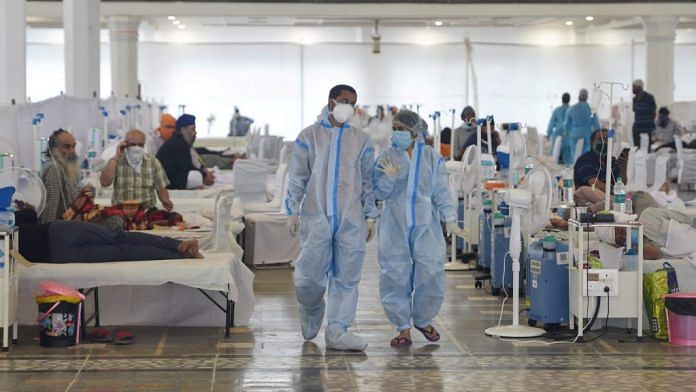New Delhi: Covid-19 illness may increase the risk of long-term adverse mental health effects — with patients experiencing depressive symptoms up to 16 months after diagnosis, according to a study published in The Lancet Public Health.
The study, published Tuesday, was conducted by an international team of researchers from the University of Iceland, Sweden’s Karolinska Institutet, University of Edinburgh, UK, and Copenhagen University Hospital of Denmark.
The team analysed data from Denmark, Estonia, Iceland, Norway, Sweden, and the UK. They looked at symptom prevalence of depression, anxiety, Covid-19-related distress, and poor sleep quality among people with and without a diagnosis of Covid-19 up to 16 months.
It included 247,249 people who were given validated questionnaires used to screen for depressive symptoms and anxiety.
Of these, 9,979 (4 per cent) were diagnosed with Covid-19 between February 2020 and August 2021. Self-reports of confirmed positive antibody or PCR tests for SARS-CoV-2 infection served as an indicator of a diagnosis.
“As we enter the third year of the pandemic, increased clinical vigilance of adverse mental health among the proportion of patients with a severe acute disease of Covid-19 and follow-up studies beyond the first year after infections are critical to ensure timely access to care,” Unnur Anna Valdimarsdóttir, a professor at the University of Iceland and one of the authors of the study, said in a statement.
The analysis finds a clear reduction of some mental health symptoms such as depression and Covid-19-related distress with time. In contrast, a longer time spent bedridden was consistently associated with a higher prevalence of mental health effects.
Also Read: 14% young Indians depressed in Covid times, most unwilling to talk about it: UNICEF report
Effect of disease intensity
The findings suggest that patients who were bedridden for seven days or more had higher rates of depression and anxiety, compared to people who were diagnosed with Covid-19 but never bedridden.
Over 16 months, patients who were bedridden for seven days or more continued to be 50-60 per cent more likely to experience higher depression and anxiety compared to people never infected during the study period.
The likelihood of depressive symptoms in non-hospitalised patients with a SARS-CoV-2 infection was also higher than people who had never been infected.
The team found that the symptoms of depression and anxiety mostly subsided within two months for non-hospitalised patients with Covid-19. However, patients who were bedridden for seven days or more remained at increased risk of depression and anxiety over the 16-month study period.
Overall, participants diagnosed with Covid-19 had a higher prevalence of depression and poorer sleep quality compared to individuals who were never diagnosed.
There were no overall differences between participants with or without Covid-19 in the rates of anxiety or Covid-related distress.
People diagnosed with Covid-19 but never bedridden due to their illness were less likely to experience symptoms of depression and anxiety than those not diagnosed with Covid-19.
According to the team, this could be because the “return to normal lives is a relief for these individuals while those still not infected are still anxious about the risk of infection and burdened by social isolation”.
“The higher occurrence of depression and anxiety among patients with Covid-19 who spent seven days or longer bedridden could be due to a combination of worrying about long-term health effects as well as the persistence of physical long Covid symptoms well beyond the illness that limit social contact and may result in a sense of helplessness,” Ingibjörg Magnúsdóttir of the University of Iceland said.
“Equally, inflammatory responses among patients with a severe diagnosis may contribute to more persistent mental health symptoms. In contrast, the fact that individuals with a mild Covid-19 infection can return to normal lives sooner and only experience a benign infection likely contributes to the lower risk of negative mental health effects we observed,” Magnúsdóttir added.
(Edited by Sunanda Ranjan)
Also Read: Depression, OCD, loss of sleep — Covid has made everything worse, but there are ways to cope



